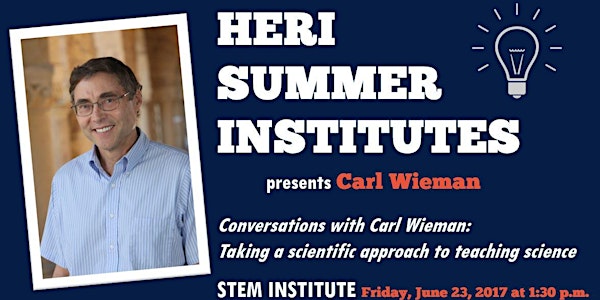
Conversations with Carl Wieman: Taking a scientific approach to teaching science (and most other subjects)
Date and time
Location
California Room
UCLA Faculty CenterDescription
Lunch is served at 12 noon followed by the talk at 1:30pm.
Abstract:
Guided by experimental tests of theory and practice, science has advanced rapidly in the past 500 years. Guided primarily by tradition and dogma, science education meanwhile has remained largely medieval. Research on how people learn is now revealing much more effective ways to teach and evaluate learning than what is in use in the traditional science class. Students and instructors find such teaching more rewarding, and it also shows students how to learn most effectively. This research is setting the stage for a new approach to teaching and learning that can provide the relevant and effective science education for all students that is needed for the 21st century. I will also cover more meaningful and effective ways to measure the quality of teaching. Although the focus of the talk is on undergraduate science and engineering teaching, where the data is the most compelling, the underlying principles come from studies of the general development of expertise and apply widely.
Bio:
Carl Wieman holds a joint appointment as Professor of Physics and of the Graduate School of Education at Stanford University. Wieman was the founder of PhET which now provides online interactive simulations that are used more than 100 million times per year to learn science in grades 4-16. Wieman directed the science education initiatives at the Universities of Colorado andBritish Columbia which carried out large scale change in teaching methods across university science departments. He also served as Associate Director for Science in the Office of Science and Technology Policy in the White House in 2010-12. He has done extensive experimental research in both atomic physics and science education at the university level. Wieman has received numerous awards recognizing his work in atomic physics, including the Nobel Prize in physics in 2001 for the first creation of a Bose-Einstein condensate. He has also studied student learning and problem solving and the comparative effectiveness of different methods for teaching science. The education work has been recognized with a number of awards including the Carnegie Foundation US University Professor of the Year in 2004, the Oersted Medal for physics education, and a lifetime achievement award from the National Science Teachers Association.
Carl Wieman’s talk is part of the HERI STEM Institute on June 22-23, 2017. To register for the 2-day HERI STEM Institute visit https://heri.ucla.edu/stem-institute/.
This event is co-sponsored by the Graduate School of Education and Information Studies, UCLA College Life Sciences, UCLA College Physical Sciences, the Henry Samueli School of Engineering and Applied Science, and the Leona B. and Harry M. Helmsley Charitable Trust.
Organized by
Higher Education Research Institute (HERI) home of the Cooperative Institutional Research Program (CIRP).